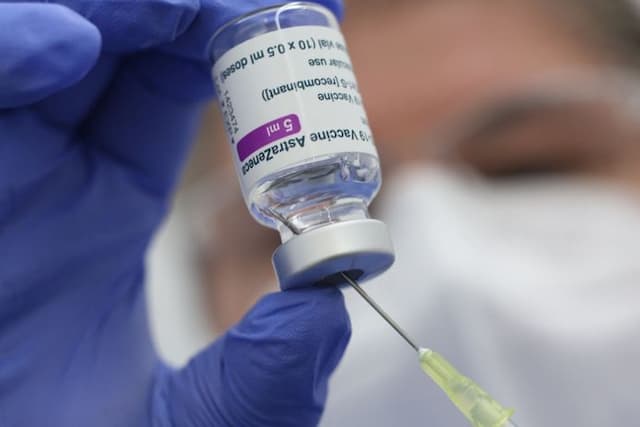The storm never ends for AstraZeneca. Initially reserved for under 65s, due to a lack of data on its effectiveness in the elderly, it was then extended to seniors … before being reserved for over 55s after rare cases of thrombosis, sometimes fatal, have been observed in younger subjects in Europe. On Wednesday 7th April, the European Medicines Agency (EMA) also recognized that blood clots should be listed as a “very rare” side effect of Vaxzevria (trade name of the vaccine).
What about those under 55 who have received a first injection (533,000 people)? The High Authority of Health (HAS) ruled this Friday, April 9: a messenger RNA vaccine will serve as a booster, namely the formulas of Pfizer and Moderna. Enough to further reduce the number of people eligible for the injection of the Swedish-British vaccine. Especially since the same day, the health authority recommended not to use it in Moselle, Guyana, Mayotte and Reunion. In question, this time: its lower effectiveness against the South African variant, which circulates particularly in these departments. In Moselle, he was responsible for 35% of the cases detected at the end of March. In the other three departments concerned, the proportion rises to 40 to 48%.
“AVOIDANT PATIENTS”
In fact, its effectiveness against the new variants of Sars-Cov-2 does not work in its favour. On April 9th, Hong Kong suspended its order. “ We believe there is no need for AstraZeneca to deliver vaccines to the city later this year, ” said Sophia Chan, local Minister of Health. “ The test campaigns took place before the variants were installed: we, therefore, knew that they would very likely modify the vaccine strategies ,” explains Étienne Decroly.
But it is above all mistrust of him that could lead to the mess of vials. In France, it is primarily distributed in pharmacies and general practitioner offices. Charge to these professionals to sell the 2.5 million doses that the country will receive by June 6, according to the Covid Tracker site. Caregivers reporting cancelled appointments are increasing. ” Obviously, we fear that people do not want it, we can see that it is already more difficult to prescribe it,” says Jacques Battistoni, president of the general practitioner union MG France. The patients are avoidant, delay the expiry of the vaccination while hoping for another formula, wonder about the future arrivals… Only those most in a hurry to be protected willingly accept the AstraZeneca vaccine ».
A MISTRUST THAT GOES ALL THE WAY TO COURT
In Calais, vials were shunned last weekend. We had to wait until Wednesday to sell them. On April 8, an Odoxa-Backbone Consulting survey carried out for Le Figaro pointed out that 71% of French people are now wary of the British vaccine.
Some take the rejection even further. In Orleans, the administrative court rejected on April 8 the request of a resident wishing to choose his anti-Covid product. Needless to say, he preferred Pfizer to AstraZeneca, the only one to have been offered to him on the Doctolib platform, arguing in particular on the side effects of the vaccine. As explained to Marianne Caroline Lantero, lecturer at Clermont Auvergne University in public law, the administrative court considered that “it has not been established that AstraZeneca is less effective than other” vaccines. Not offering an alternative formula to this vaccine, therefore, does not “infringe the right to appropriate care”.
“DOSES COULD END UP UNUSED”
The situation could be particularly problematic after April 16. On this date, injections will be possible for all people over 60, regardless of their state of health. “ At that time, we clearly fear that the Pfizer and Moderna meetings will start much faster than those of AstraZeneca… ”, reports Jacques Battistoni.
” Doses could end up unused “, deplores Jacques Battistoni. On the eve of summer, deliveries of the two RNA vaccines are expected to increase sharply, as Johnson & Johnson s product gradually ramps up. But until then, AstraZeneca remains an essential ally. ” We cannot do without him if we want to achieve the objectives, the others will not be enough ” adds Jacques Battistoni. The government promised 20 million immunized in mid-May, 10 million more a month later.
AN EFFECTIVE VACCINE
In the eye of the storm, one would almost forget the undeniable effectiveness of the formula. ” The public primarily retains the extremely rare and absent side effects for the Pfizer vaccine, rather than the effectiveness “, regrets the president of the union of general practitioners MG France. The product prevents 76% of contamination. Above all, it is 94% effective against the risk of severe forms, according to a Scottish study. But history has shown it: when doubt is cast on a vaccine, turning back the clock is almost an impossible task.
How to avoid this outcome? ” Remembering that other drugs, such as the pill, present risks, without calling into question their effectiveness, ” concludes Jacques Battistoni. The new reversals, however, risk increasing the impression of trial and error. ” Precisely, in my opinion, this shows that the health authorities are monitoring the situation very rigorously, and changing the protocols exceptionally quickly when necessary ,” Étienne Decroly analyzes. Few people are used to reasoning in terms of the risk benefit balance: the idea of zero risk, especially for vaccines, is very widespread ”.
Moreover, the very rare cases of thrombosis observed could not be predicted by clinical trials. “ They included 20,000 people, but the frequency of thrombosis is much lower. We are talking about a few cases out of millions of vaccinated ”, continues the specialist. It is impossible, under these conditions, to detect them significantly before very large-scale injection.



